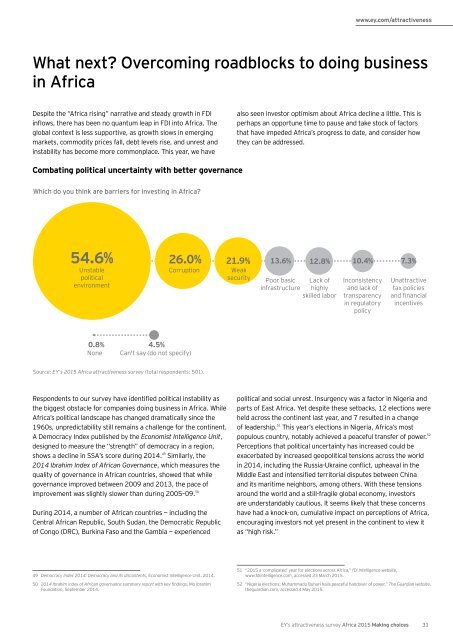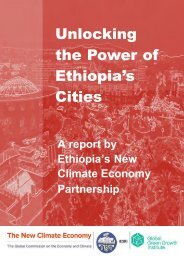EY-africa-attractiveness-survey-june-2015-final
EY-africa-attractiveness-survey-june-2015-final
EY-africa-attractiveness-survey-june-2015-final
Create successful ePaper yourself
Turn your PDF publications into a flip-book with our unique Google optimized e-Paper software.
www.ey.com/<strong>attractiveness</strong>What next? Overcoming roadblocks to doing businessin AfricaDespite the “Africa rising” narrative and steady growth in FDIinflows, there has been no quantum leap in FDI into Africa. Theglobal context is less supportive, as growth slows in emergingmarkets, commodity prices fall, debt levels rise, and unrest andinstability has become more commonplace. This year, we havealso seen investor optimism about Africa decline a little. This isperhaps an opportune time to pause and take stock of factorsthat have impeded Africa’s progress to date, and consider howthey can be addressed.Combating political uncertainty with better governanceWhich do you think are barriers for investing in Africa?54.6% 26.0% 21.9% 13.6% 12.8% 10.4% 7.3%UnstablepoliticalenvironmentCorruptionWeaksecurityPoor basic Lack ofinfrastructure highlyskilled laborInconsistencyand lack oftransparencyin regulatorypolicyUnattractivetax policiesand financialincentives0.8% 4.5%None Can't say (do not specify)Source: <strong>EY</strong>’s <strong>2015</strong> Africa <strong>attractiveness</strong> <strong>survey</strong> (total respondents: 501).Respondents to our <strong>survey</strong> have identified political instability asthe biggest obstacle for companies doing business in Africa. WhileAfrica’s political landscape has changed dramatically since the1960s, unpredictability still remains a challenge for the continent.A Democracy Index published by the Economist Intelligence Unit,designed to measure the “strength” of democracy in a region,shows a decline in SSA’s score during 2014. 49 Similarly, the2014 Ibrahim Index of African Governance, which measures thequality of governance in African countries, showed that whilegovernance improved between 2009 and 2013, the pace ofimprovement was slightly slower than during 2005–09. 50During 2014, a number of African countries — including theCentral African Republic, South Sudan, the Democratic Republicof Congo (DRC), Burkina Faso and the Gambia — experiencedpolitical and social unrest. Insurgency was a factor in Nigeria andparts of East Africa. Yet despite these setbacks, 12 elections wereheld across the continent last year, and 7 resulted in a changeof leadership. 51 This year’s elections in Nigeria, Africa’s mostpopulous country, notably achieved a peaceful transfer of power. 52Perceptions that political uncertainty has increased could beexacerbated by increased geopolitical tensions across the worldin 2014, including the Russia-Ukraine conflict, upheaval in theMiddle East and intensified territorial disputes between Chinaand its maritime neighbors, among others. With these tensionsaround the world and a still-fragile global economy, investorsare understandably cautious. It seems likely that these concernshave had a knock-on, cumulative impact on perceptions of Africa,encouraging investors not yet present in the continent to view itas “high risk.”49 Democracy Index 2014: Democracy and its discontents, Economist Intelligence Unit, 2014.50 2014 Ibrahim index of African governance summary report with key findings, Mo IbrahimFoundation, September 2014.51 “<strong>2015</strong> a ‘complicated’ year for elections across Africa,” fDi Intelligence website,www.fdiintelligence.com, accessed 23 March <strong>2015</strong>.52 “Nigeria elections: Muhammadu Buhari hails peaceful handover of power,” The Guardian website,theguardian.com, accessed 4 May <strong>2015</strong>.<strong>EY</strong>’s <strong>attractiveness</strong> <strong>survey</strong> Africa <strong>2015</strong> Making choices31



